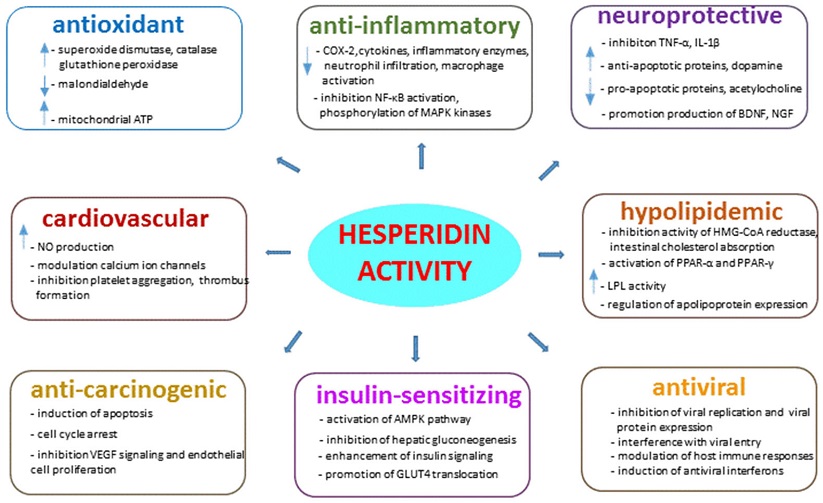Nikhil Prasad Fact checked by:Thailand Medical News Team Jun 05, 2024 10 months, 3 weeks, 11 hours, 21 minutes ago
COVID-19 News: The COVID-19 pandemic, caused by the novel SARS-CoV-2 virus, has triggered an unprecedented global health crisis since its emergence in late 2019. Originating in Wuhan, China, the virus rapidly spread worldwide, prompting the World Health Organization (WHO) to declare a pandemic in March 2020. COVID-19, characterized by symptoms ranging from mild respiratory distress to severe pneumonia and death, has necessitated the urgent development of effective therapeutic interventions. Despite the rapid development and deployment of several vaccines, the emergence of new variants has underscored the need for continued exploration of additional antiviral agents.
 Hesperidin’s mechanisms of activity
Hesperidin: A Natural Compound with Promising Potential
Hesperidin’s mechanisms of activity
Hesperidin: A Natural Compound with Promising Potential
Among the myriad of natural compounds under investigation, hesperidin - a bioflavonoid found in citrus fruits - has emerged as a promising candidate. This study review by researchers from Wroclaw Medical University-Poland that is covered in this
COVID-19 News report, explores the chemical properties, bioavailability, and antiviral mechanisms of hesperidin, focusing on its potential efficacy against SARS-CoV-2. The study integrates laboratory findings with epidemiological data on citrus consumption in China between 2020 and 2024, aiming to understand hesperidin's role in mitigating COVID-19.
Methodology: Systematic Review and Analysis
A systematic review was conducted using databases such as PubMedPico, Scopus, and Web of Science, adhering to PRISMA guidelines. Out of 207 articles reviewed, 37 were selected for detailed analysis. These studies included in vitro, in silico, and clinical investigations into hesperidin's antiviral effects, alongside epidemiological studies examining citrus consumption in China.
Chemical Properties and Sources of Hesperidin
Chemically, hesperidin (C28H34O15) comprises the aglycone hesperetin linked to the disaccharide rutinose. Predominantly found in citrus fruits like sweet oranges, sour oranges, lemons, limes, and grapefruits, hesperidin is concentrated in the peels and membranes of these fruits. The concentration of hesperidin varies depending on the type of fruit, cultivar, and extraction method. Its known antioxidant properties make it a subject of significant interest in antiviral research.
Bioavailability and Metabolism
Hesperidin's bioavailability and metabolism are critical in determining its therapeutic potential. Upon ingestion, hesperidin is hydrolyzed to its aglycone form, hesperetin, which exhibits enhanced bioactivities. Studies indicate that hesperidin and its metabolites are primarily excreted through urine. Factors such as the form of consumption, gut microbiota composition, and the presence of other dietary components influence its bioavailability.
Biological and Pharmacological Activities
-Antioxidant and Anti-Inflammatory Effects
Hesperidin's antioxidant properties in
volve scavenging harmful free radicals and protecting cells from oxidative damage. It enhances the activity of endogenous antioxidant enzymes and reduces lipid peroxidation. Additionally, hesperidin exhibits anti-inflammatory effects by inhibiting pro-inflammatory mediators and modulating signaling pathways involved in inflammation.
-Neuroprotective and Cardiovascular Benefits
Studies have demonstrated hesperidin's neuroprotective effects, potentially protecting nerve cells from damage and degeneration. Its cardiovascular benefits include improving endothelial function, promoting vasodilation, and exhibiting anti-thrombotic effects. These properties contribute to hesperidin's potential in managing cardiovascular diseases.
Hesperidin's Role in SARS-CoV-2 Inhibition
-Clinical Studies
Clinical trials have explored hesperidin's efficacy in reducing COVID-19 symptoms. A study by Dupuis et al. investigated hesperidin administration in non-vaccinated COVID-19 patients, finding a reduction in specific symptoms like anosmia.
https://pubmed.ncbi.nlm.nih.gov/36387348/
Another study at Tanta University examined hesperidin's potential in preventing SARS-CoV-2 infection by hindering viral entry and bolstering the host's immune response.
https://clinicaltrials.gov/study/NCT04452799?cond=Covid19&intr=hesperidin&rank=2
-In Vitro and In Silico Studies
In vitro and in silico studies have demonstrated hesperidin's ability to inhibit viral replication and interfere with viral entry into host cells. Molecular docking simulations and cell culture experiments have shown that hesperidin interacts with key proteins involved in SARS-CoV-2 entry and replication, suggesting its potential as a therapeutic agent.
Citrus Consumption and COVID-19 in China
China, a major producer and consumer of citrus fruits, provides a unique context for examining the impact of hesperidin intake on COVID-19. Epidemiological studies indicate that despite high citrus consumption, SARS-CoV-2 infection rates remain significant, suggesting that citrus intake alone may not significantly alter virus incidence but could contribute to overall health benefits.
Future Directions and Conclusions
Further clinical trials are necessary to fully evaluate hesperidin's efficacy and safety in treating COVID-19. Enhancing its bioavailability through advanced formulation strategies and conducting expanded epidemiological studies are crucial steps. Understanding the molecular mechanisms of hesperidin's antiviral effects will aid in developing targeted therapeutic strategies.
In conclusion, hesperidin emerges as a promising candidate in the fight against COVID-19, offering potential preventive and therapeutic benefits. While further research is essential to fully exploit its potential, current findings lay a strong foundation for future exploration and development of hesperidin-based interventions. The integration of dietary recommendations and the development of hesperidin-based supplements could play a significant role in improving public health and managing viral infections.
The findings from the study review were published in the peer reviewed journal: Medicina.
https://www.mdpi.com/1648-9144/60/6/892
For the latest
COVID-19 News, keep on logging to Thailand Medical News.
Read Also:
https://www.thailandmedical.news/news/covid-19-diets-study-shows-that-diets-rich-in-citrus-fruits-containing-hesperidin-might-be-a-healthy-option-for-dealing-with-sars-cov-2
https://www.thailandmedical.news/news/australian-study-finds-that-supplementation-with-citrus-bioflavonoids-helps-with-management-of-type-2-diabetes
